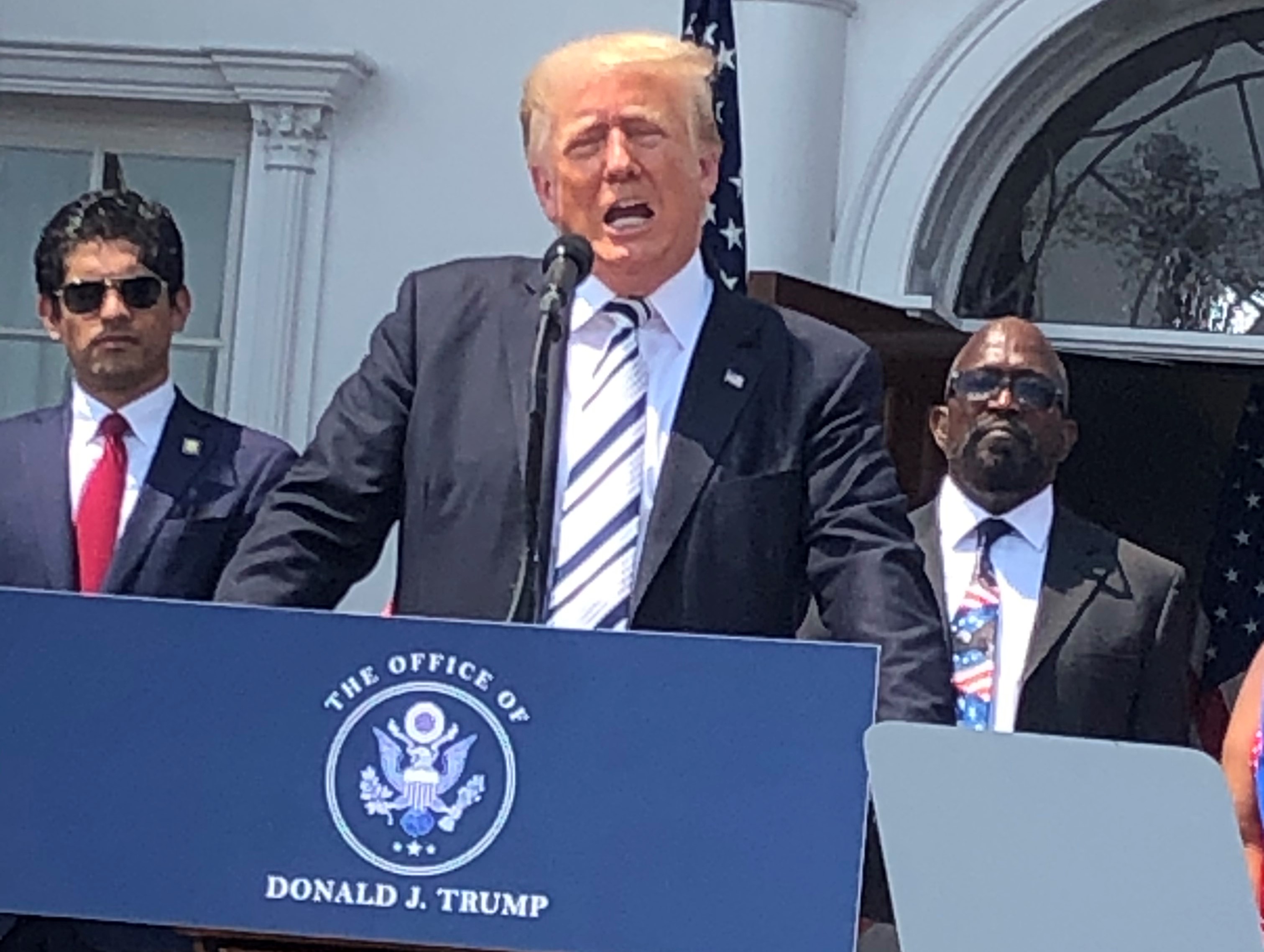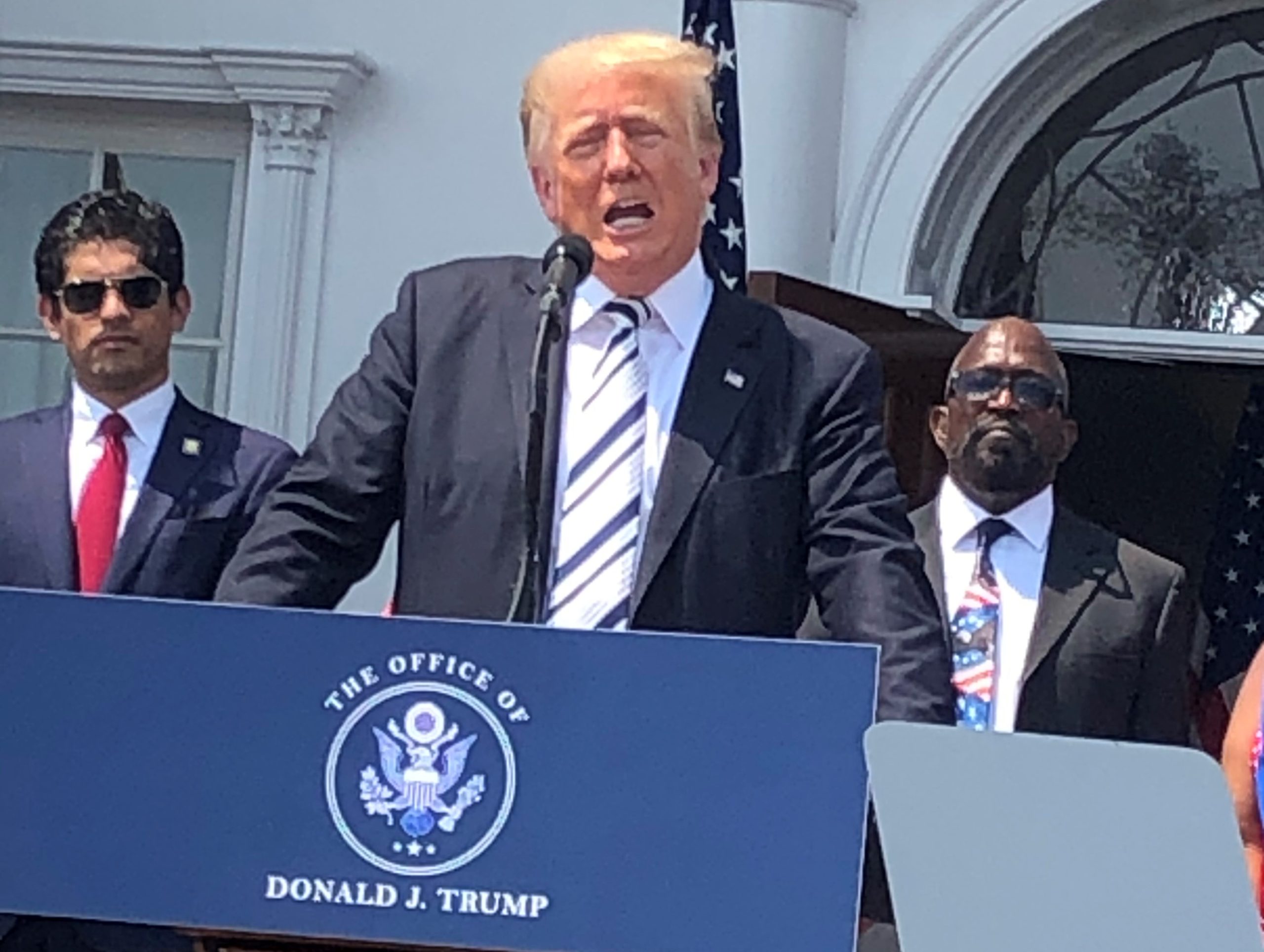
Despite ongoing criminal prosecutions and adverse civil judgements former President Donald Trump is on pace to claim the Republican Party’s nomination in Milwaukee in July. The same man who inspired a violent insurrection in 2021 to upend the peaceful democratic transition of power has still not yet been held accountable and it’s increasingly looking like this heavy lift will be left entirely to the voters.
Sadly, it would appear the machinery we have to hold the ex-president to account might have been effective in an earlier century before we let the presidency itself become nearly omnipotent empowered with the nuclear codes and access to the state secrets of the largest military machine on earth. And then there was President Ford’s pardoning of Nixon which set the very dubious precedent that a fall from grace was sufficient punishment for Nixon’s high crimes.
Why even when the president is out of office, he continues to enjoy world-class executive protection even if he’s promising to limit his dictatorship to only his ‘first day’ of his second term.
Donald Trump is the colossus a few centuries in the making. He’s a 21st century Gulliver and the army of prosecutors from several jurisdictions now appear like Lilliputians trying to tie him down while he reaches out to the world’s wealthiest men like Elon Musk who himself has been permitted to grow so substantial he has his own foreign policy.
In this brave new world of super-sized predator capitalists our democracy itself seems quaint.
Much has changed since the framers of the U.S. Constitution did their work particularly with regard to the growth of multinational enterprises that have grown so large they can play the nations of the world off of each other for the best tax rate and regulatory regime. While we have put the presidency on steroids, U.S. tax policy has fueled a global corporate concentration and consolidation by multinationals whose interests can be very much at odds with America’s strategic goals as well as the very livability of our planet itself.
Last week, former President Trump, who faces multiple criminal charges and sanctions related to a half a billion dollars in civil judgements seemed to be up against the wall when at the 11th hour a multi-billion dollar insurance multinational with deep New Jersey roots rode to his rescue.
Trump turned to the Federal Insurance Company, a subsidiary of the Chubb Corporation to post a $91.6 million bond to guarantee that the $88.3 million civil judgement he was ordered to pay for defaming E. Jean Carroll twice would be paid in the event he loses his appeal. While some news outlets reported that Chubb was New Jersey based, the parent multinational’s global headquarters is in Switzerland.
According to the New Jersey Business Almanac, Chubb is now the “world’s largest publicly traded property and casualty insurer” after it was swallowed up in 2016 for $29.7 billion by ACE Limited already headquartered in Switzerland. At the time, Chubb president and CEO John Finnegan reportedly received a $90 million severance package. The Wall Street Journal reported it was the biggest such acquisition between two insurance companies.
The Almanac recounts that Chubb was founded in 1882 by Thomas C. Chubb as a marine underwriter to help shippers manage all manner of risks to their enterprise and cargo. In 1967, the Chubb holding company was organized as a New Jersey corporation and in 1983 it shifted its corporate headquarters from New York City to Warren, New Jersey,
According to multiple news sources, in 2018 Trump appointed Chubb’s CEO Evan Greenberg to a White House Advisory Committee for Trade Policy and Negotiations .
“Our surety division provides appeal bonds in the normal course of business. These bonds are an ordinary and important part of the American justice system, protecting the rights of both defendants and plaintiffs,” Chubb told the Washington Post in a statement.
Last November, it was Greenberg, who chairs the National Committee on U.S. China Relations who had the honor of introducing Xi Jinping, president of the People’s Republic of China in San Francisco. Several months earlier Greenberg used his annual letter to shareholders to warn that the United States needed to “tone down rhetoric and symbolism around Taiwan. Supporting Taiwan as a demonstration of opposition to China does not improve America’s national security; it just raises China’s insecurity and feeds its impulses to overact to Taiwan related events.”
Greenberg holds no elective office but is on that roster of global power players riding the tsunami of wealth concentration and multinational primacy. Indeed, the value of Chubb’s assets ranks it larger than the annual budgets of all but 15 of the world’s wealthiest nations. Chubb’s CEO would be leaving influence on the table if he did not try and use that kind of leverage to shape global affairs in a way that served his company’s long term business goals and what he sees as what’s best for the planet.
In 2019, Chubb committed to curtailing underwriting “new risks for companies that generate more than 30 percent of revenues from thermal coal mining. Chubb will phase out coverage of existing risks that exceed this threshold by 2022.”
“Chubb recognizes the reality of climate change and the substantial impact of human activity on our planet,” Greenberg said in a statement. “Making the transition to a low-carbon economy involves planning and action by policymakers, investors, businesses and citizens alike. The policy we are implementing today reflects Chubb’s commitment to do our part as a steward of the Earth.”
In the immediate aftermath of the Jan. 6 insurrection Greenberg made it clear where he stood.
“As citizens of our great nation, all of us have a responsibility to speak out against and condemn in the strongest terms the violence and display of demagoguery we witnessed in our nation’s capital yesterday. This is not who we are as a nation and our democracy must be protected,” Greenberg said in a Jan. 7 statement issued by Chubb. “Whether one likes the results of our election or not, the citizens of our country have spoken.”
Evan Greenberg is the son of the combative Maurice R. Greenberg, the former chief executive of American International Group, who in 2017 reached a settlement, along with Howard Smith, A.I.G.’s former CFO, on civil accounting fraud charges that were initiated twelve years earlier by New York Attorney General Eliot Spitzer.
“In the settlement, the two men acknowledged that they had participated in and approved two transactions that inaccurately portrayed A.I.G.’s financial results over four years,” the New York Times reported. “They agreed to give up more than $9.9 million that they received as performance bonuses from 2001 through 2004, with Mr. Greenberg paying most of that amount. But it is a fraction of the more than $50 million the state had sought.”
Both the elder Greenberg and Smith acknowledged their roles in the transactions, but did not admit to committing fraud, according to the Times.
Maurice R. Greenberg also sits on the National Committee on U.S. China Relations as does former Gov. Tom Kean and dozens of others of civically minded corporate executives, retired military officers and academics.
Nothing to see here. Just global business types doing business and managing the planet, right? It’s not like we have to worry about big business getting in bed with an authoritarian leader.
That’s never happened……
(Visited 81 times, 81 visits today)
Chubb, one of the largest insurance companies in the world, has recently come under scrutiny for providing financial support to former President Donald Trump. The company, which is headquartered in New Jersey, has faced backlash from customers and shareholders alike for its ties to the controversial political figure.
According to reports from Insider NJ, Chubb donated over $500,000 to Trump’s campaign and inauguration fund during his time in office. This has raised concerns among some customers who feel that their premiums are being used to support a political agenda that they may not agree with.
In response to the backlash, Chubb has stated that their donations were made in accordance with company policy and were not intended to endorse any specific political candidate or party. The company has also emphasized that they have a long history of supporting both Democratic and Republican candidates in order to promote a balanced political landscape.
Despite these explanations, many customers are still calling for Chubb to sever ties with Trump and refrain from making any future political donations. Some have even threatened to take their business elsewhere if the company continues to support the former president.
It remains to be seen how Chubb will navigate this controversy and whether they will make any changes to their political donation policies in the future. In the meantime, customers and shareholders will be closely watching to see how the company responds to this backlash and whether they will take steps to address the concerns of those who feel uncomfortable with their financial support of Trump.

